(完整word)初一英语一般现在时讲解及练习
初中七年级的一般现在时及现在进行时讲解与习题.docx
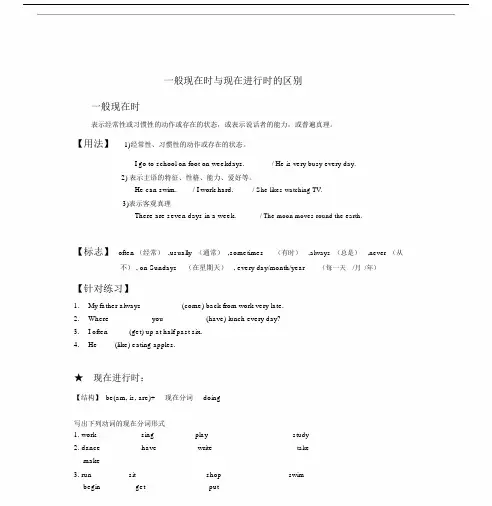
----一般现在时与现在进行时的区别一般现在时表示经常性或习惯性的动作或存在的状态,或表示说话者的能力,或普遍真理。
【用法】1)经常性、习惯性的动作或存在的状态。
I go to school on foot on weekdays./ He is very busy every day.2)表示主语的特征、性格、能力、爱好等。
He can swim./ I work hard./ She likes watching TV.3)表示客观真理There are seven days in a week./ The moon moves round the earth.【标志】often (经常) ,usually (通常) ,sometimes(有时),always(总是),never(从不) , on Sundays(在星期天), every day/month/year(每一天/月/年)【针对练习】1.My father always __________(come) back from work very late.2.Where __________ you __________ (have) lunch every day?3.I often _____(get) up at half past six.4.He ____(like) eating apples.★现在进行时:【结构】 be(am, is, are)+现在分词doing写出下列动词的现在分词形式1. work___________ sing__________ play__________study__________2. dance__________ have__________ write__________take__________make__________3. run_________ sit___________shop__________swim__________begin_________get__________put__________4. lie__________(以ie结尾的动词,把ie 改为y, 再加ing )tie_________【用法】1)表示现在(说话瞬间)正在进行或发生的动作。
(word完整版)初一一般现在时讲解及其练习
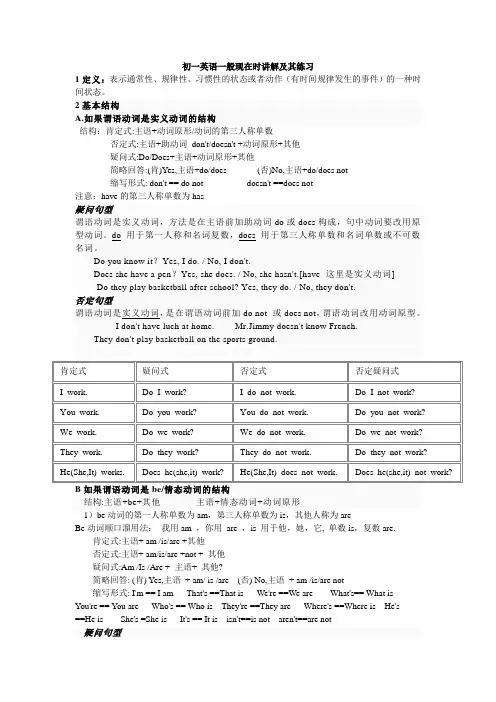
初一英语一般现在时讲解及其练习1定义:表示通常性、规律性、习惯性的状态或者动作(有时间规律发生的事件)的一种时间状态。
2基本结构A.如果谓语动词是实义动词的结构结构:肯定式:主语+动词原形/动词的第三人称单数否定式:主语+助动词don't/doesn't +动词原形+其他疑问式:Do/Does+主语+动词原形+其他简略回答:(肯)Yes,主语+do/does (否)No,主语+do/does not缩写形式: don't == do not doesn't ==does not注意:have的第三人称单数为has1)be动词的第一人称单数为am,第三人称单数为is,其他人称为areBe动词顺口溜用法:我用am ,你用are ,is 用于他,她,它, 单数is,复数are.肯定式:主语+ am /is/are +其他否定式:主语+ am/is/are +not + 其他疑问式:Am /Is /Are + 主语+ 其他?简略回答: (肯) Yes,主语+ am/ is /are (否) No,主语+ am /is/are not缩写形式: I'm == I am That's ==That is We're ==We are What's== What isYou're == You are Who's == Who is They're ==They are Where's ==Where is He's==He is She's =She is It's == It is isn't==is not aren't==are not疑问句型写出下列动词的第三人称单数:study play go come help teach lie listen begin open sit wash guess cut run eat B 助动词a. 基本助动词be (是) - am, is, areI 用am ;she/he/it, 名词单数都用is ;we, you, they, 名词复数都用areb. 基本助动词have (有) - have, hasI, we, you, they, 名词复数都用have ;she/he/it is, 名词单数都用hasc. 基本助动词do-do doesI, we, you, they, 名词复数都用do ;she/he/it is, 名词单数都用doesd.情态助动词,不论单复数、不论什么人称都没有变化,都用can, may 等。
一般现在时知识点梳理及经典练习(超详细)(word)
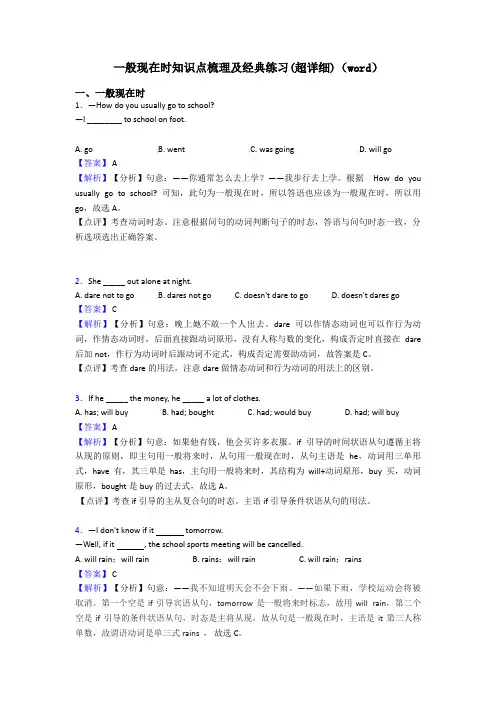
一般现在时知识点梳理及经典练习(超详细)(word)一、一般现在时1.—How do you usually go to school?—I ________ to school on foot.A. goB. wentC. was goingD. will go【答案】 A【解析】【分析】句意:——你通常怎么去上学?——我步行去上学。
根据How do you usually go to school? 可知,此句为一般现在时,所以答语也应该为一般现在时,所以用go,故选A。
【点评】考查动词时态。
注意根据问句的动词判断句子的时态,答语与问句时态一致,分析选项选出正确答案。
2.She _____ out alone at night.A. dare not to goB. dares not goC. doesn't dare to goD. doesn't dares go【答案】 C【解析】【分析】句意:晚上她不敢一个人出去。
dare可以作情态动词也可以作行为动词,作情态动词时,后面直接跟动词原形,没有人称与数的变化,构成否定时直接在dare 后加not,作行为动词时后跟动词不定式,构成否定需要助动词,故答案是C。
【点评】考查dare的用法,注意dare做情态动词和行为动词的用法上的区别。
3.If he _____ the money, he _____ a lot of clothes.A. has; will buyB. had; boughtC. had; would buyD. had; will buy【答案】 A【解析】【分析】句意:如果他有钱,他会买许多衣服。
if引导的时间状语从句遵循主将从现的原则,即主句用一般将来时,从句用一般现在时,从句主语是he,动词用三单形式,have有,其三单是has,主句用一般将来时,其结构为will+动词原形,buy买,动词原形,bought是buy的过去式,故选A。
七年级一般现在时讲解及练习精
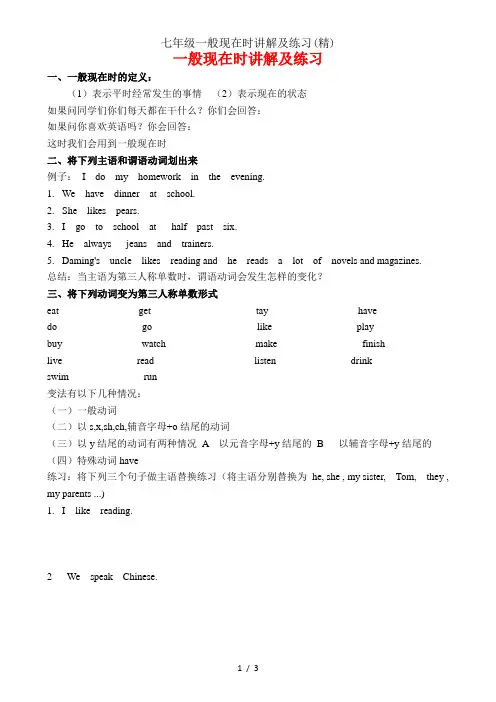
一般现在时讲解及练习一、一般现在时的定义:(1)表示平时经常发生的事情(2)表示现在的状态如果问同学们你们每天都在干什么?你们会回答:如果问你喜欢英语吗?你会回答:这时我们会用到一般现在时二、将下列主语和谓语动词划出来例子:I do my homework in the evening.1.We have dinner at school.2.She likes pears.3.I go to school at half past six.4.He always jeans and trainers.5.Daming's uncle likes reading and he reads a lot of novels and magazines.总结:当主语为第三人称单数时,谓语动词会发生怎样的变化?三、将下列动词变为第三人称单数形式eat get tay havedo go like playbuy watch make finishlive read listen drinkswim run变法有以下几种情况:(一)一般动词(二)以s,x,sh,ch,辅音字母+o结尾的动词(三)以y结尾的动词有两种情况 A 以元音字母+y结尾的 B 以辅音字母+y结尾的(四)特殊动词have练习:将下列三个句子做主语替换练习(将主语分别替换为he, she , my sister, Tom, they , my parents ...)1.I like reading.2 We speak Chinese.3 She goes to school every day.四、将下列句子变为一般疑问句及否定句并观察其变法I often get up at six o'clock.Do you often get up at six o'clock ?I don't often get up at six o'clock.1.We play football in the afternoon.2.I usually send emails to my friend.3.They do their homework on the computer .4.Tom and Tony have breakfast at home.5.I live in China.总结:当主语为第一、二人称或第三人称复数时,一般疑问句变法:否定句变法五、将下列句子变为一般疑问句及否定句并观察其变法She wears silk shirts.Does she wear silk shirts? She doesn't wear silk shirts.1 He usually listens to music.2 She gets up early.3 My brother likes maths.4 The boy runs in the morning.总结:当主语为第三人称单数时,一般疑问句变法为:否定句变法为:综合练习:一、用所给动词的正确形式填空1 The camel __________( eat ) grass.2 They ________( live) in the desert.3 I ________( like ) playing basketball.4 My aunt usually _________( make) a cake.5 She often _________( buy ) presents for her family.6 Linda __________( sing ).7 We _________( have ) a great time.8 My friends ____________( like ) birthdays.9 My aunt and uncle usually _____________( remember ) our birthdays.10 Mr. Li _________( come ) from England.二、用don't和doesn't完成句子1 Daming and Lingling ____________( not have ) lunch at home.2 Daming _________( not drink ) Coke.3 They ________________(not read ) magazines.4 We _______________( not play ) computer games.5 Betty _______________( not watch ) TV in the evening.三、分别用do和does写出一般疑问句并回答you , go to bed, at half past ten ?Do you go to bed at half past ten ? Yes, I do. / No, I don't.1 monkeys , come from, Africa ?2 she , like, English3 he , play computer games ?4 they , have a computer ?5 your mother , watch TV, in the evening?6 your teacher , speak English ?。
(完整版)一般现在时讲解+练习
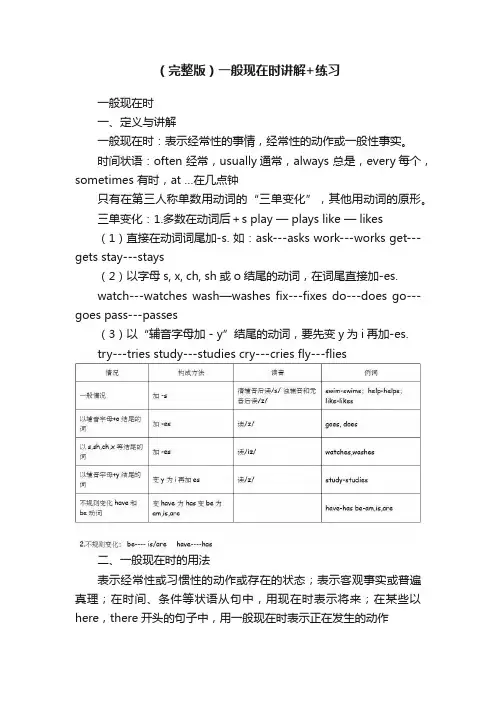
(完整版)一般现在时讲解+练习一般现在时一、定义与讲解一般现在时:表示经常性的事情,经常性的动作或一般性事实。
时间状语:often 经常,usually通常,always 总是,every每个,sometimes 有时,at …在几点钟只有在第三人称单数用动词的“三单变化”,其他用动词的原形。
三单变化:1.多数在动词后+s play — plays like — likes(1)直接在动词词尾加-s. 如:ask---asks work---works get---gets stay---stays(2)以字母s, x, ch, sh或o结尾的动词,在词尾直接加-es.watch---watches wash—washes fix---fixes do---does go---goes pass---passes(3)以“辅音字母加 - y”结尾的动词,要先变y为i再加-es.try---tries study---studies cry---cries fly---flies二、一般现在时的用法表示经常性或习惯性的动作或存在的状态;表示客观事实或普遍真理;在时间、条件等状语从句中,用现在时表示将来;在某些以here,there开头的句子中,用一般现在时表示正在发生的动作当主语是第三人称单数时:1、动词变相应的第三人称单数形式2、肯定句主语+动词s+其它3、否定句主语+doesn't+动词原形+其它4、一般疑问句Does+主语+动词原形+其它5、肯定回答 Yes,主语+does6、否定回答 No,主语+doesn't7、特殊疑问句特殊疑问词+一般疑问句当主语不是第三人称单数时:1、肯定句主语+动词原形+其它2、否定句主语+don't+动词原形+其它3、一般疑问句 Do+主语+动词原形+其它4、要注意,句式结构错则全都错。
5、谓语动词的形式:do/does一般现在时练习一、用所给词的正确形式填空1. We often ___________ (play) on the playground.2. He _________ (get) up at six o’clock.3. __________you _________ (brush) your teeth every morning.4. What____ (do) he usually _____ (do) after school?5. Danny _______ (study) English, Chinese, Math, Science and Art at school.6. Mike sometimes __________ (go) to the park with his sister.7. At eight at night, she ________ (watch) TV with his parents.8. ________ Mike________ (read) English every day?9. How many lessons ______your classmate____ (have) on Monday?10. What time ____his mother_________ (do) the housework?11. He often ______ (have) dinner at home. 12. Daniel and Tommy___ (be) in Class One. 13. We____ (not watch) TV on Monday. 14. Nick _____(not go) to the zoo on Sunday.15. They______ (like) the World Cup? 16. What ____they often ____ (do) on Saturdays17. Your parents________ (read) newspapers every day?18. The girl______ (teach) us English on Sundays.19. She and I _______ (take) a walk together every evening.20. There_______ (be) some water in the bottle. 21. Mike ______ (like) cooking.22. They_______ (have) the same hobby. 23. My aunt______ (look) after her baby carefully.24. You always____ (do) your homework well. 25. I_____ (be) ill. I’m sta ying in bed.26. She_____ (go) to school from Monday to Friday. 27. Liu Tao _____ (do) not like PE.28. The child often______ (watch) TV in the evening.29. Su Hai and Su Yang ______(have) eight lessons this term.30. -What day ______(be) it today? -It’s Saturday.31. Don’t make a noise. Grandpa __________ (sleep).32. Tom’s family__________ (watch) TV.33. It ________ (take) me two hours to finish my homework last night.34. What ______ your mother _______ (do) every evening? She_______ (wash) clothes.35. _______ it ______ (rain) every day?36. What _______ (do) you _______ on Sundays? We ________ (play) football.37. There ________ (be) a football match on TV every morning.38. They often ________ (visit) the Great Wall.39. Who _______ (dance) the best in your class?40. He _____________ (not come).41. The earth __________ (move) round the sun.42 She ________ (buy) a sweater.43. Mr. Wang often______ (go) to Shanghai.二、改句子1. Do you often play football after school? (肯定回答)_______________________________2. I have many books. (改为否定句)_______________________________3. Gao Shan's sister likes playing table tennis (改为否定句)________________________4. She lives in a small town near New York. (改为一般疑问句)________________________5. I watch TV every day. (改为一般疑问句)________________________6. David has a goal. (改为一般疑问句)________________________7. We have four lessons.(否定句)________________________8. Nancy doesn’t run fast (肯定句)________________________9. My dog runs fast. (一般疑问句) ________________________(把10—14小题变否定句,一般疑问句和划线提问)10. Mike has two letters for him. ________________________11. I usually play football on Friday afternoon.________________________12. Su Yang usually washes some clothes on Saturday. ________________________13. Mingming usually waters the flowers every day. ________________________14. Tom does his homework at home. ________________________三、写出下列动词的第三人称单数形式:1. wash_________ match _______ guess______ study______finish_________ go________ snow______ carry_________2. stop______ see________ drive ________let_______ carry______keep_____ join______ find_______ think________ teach______ catch______3. stay_______ begin______ forget_______ lie________ die _______run_______ prefer______ give________ ring_______ dance______ hope_______四、单项选择:1. There _____ an English film at the cinema now.A. will haveB. is going to haveC. is going to beD. is2. The picture _______ nice. A. looks B. is looked C. look D. is looking3. She ______ down and soon falls asleep. A. live B. lain C. laidD. sits4. They _____ the office in time very morning. A. reach to B. arrived C. went D. get to5. We shall go to Shanghai on business before you _____ back next week.A. will comeB. cameC. would comeD. come6. The plane ______ over there. A. is B. are C.am D. was7. I see her ____ the room this morning. A. to enter B. enteredC. enterD. enters8. The teacher ________us to come to school on time. A. ask B. asking C. asks D. asked9. John always ______ others. A. help B. helping C. helps D. to help10. He ______for eight hours every day. A. working B. to workC. worksD. worked11. You’d better ______ at home and ______ your homework.A. to stay, doB. stay, doC. to stay, to doD. stay, to do12. He sits down and ______ a rest. A. having B. have C. to haveD. has13. Uncle Wang never ______ a cake. A. make B. to make C. making D. makes五、请写出下列句子1.他每天早上七点乘公交车去上学。
最新初一英语一般现在时讲解及练习
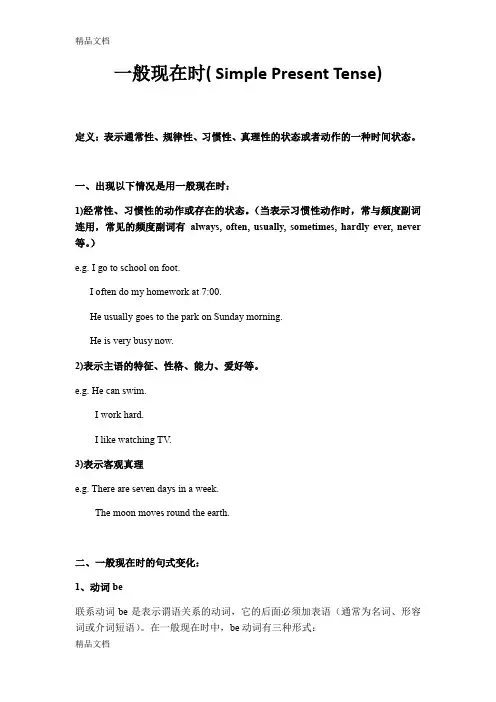
一般现在时( Simple Present Tense)定义:表示通常性、规律性、习惯性、真理性的状态或者动作的一种时间状态。
一、出现以下情况是用一般现在时:1)经常性、习惯性的动作或存在的状态。
(当表示习惯性动作时,常与频度副词连用,常见的频度副词有always, often, usually, sometimes, hardly ever, never 等。
)e.g. I go to school on foot.I often do my homework at 7:00.He usually goes to the park on Sunday morning.He is very busy now.2)表示主语的特征、性格、能力、爱好等。
e.g. He can swim.I work hard.I like watching TV.3)表示客观真理e.g. There are seven days in a week.The moon moves round the earth.二、一般现在时的句式变化:1、动词be联系动词be是表示谓语关系的动词,它的后面必须加表语(通常为名词、形容词或介词短语)。
在一般现在时中,be动词有三种形式:一、用be的适当形式填空1.---How____ you? ---I____ fine.2.I___ David,and my family name___ Green.3.---What color ___ your clock? ---It___ white.4.---What___ this in English?---It___ an apple.5.Toy___my brother.David____my brother,too.They ___ my brothers.6.Look!These____apple trees.7.We____ good students and you____ good teacher.8.My sister and my brother_____ students.9. _____there many eggs in the kitchen?10.____your card number 5578?11.Where_____ your pencils?12.These sweaters ______ fifty dollars.13.How much ____ his jacket?14.My brother’s birthday____ December 11th.15.When _____ Kate’s birthday?16、There_____a boy and two girls beside the gate.17、Five and three ____ eight.二、.将下面的句子变成一般疑问句。
一般现在时-知识点归纳与练习(word)1
一般现在时-知识点归纳与练习(word)1一、一般现在时1.She wants to be a famous singer when she ___________.A. grown upB. growing upC. grew upD. grows up【答案】 D【解析】【分析】句意:当她长大时,她想当一名著名的歌手。
分析句子结构可知,此处是when引导的时间状语从句,when从句应该用一般现在时代替将来时,且此处主语是第三人称单数,所以谓语动词用三单形式,故选D。
【点评】考查一般现在时。
注意when引导的时间状语从句中,when从句应该用一般现在时代替将来时。
2.My father is a tea lover. He __________ tea every day.A. drinkB. drinksC. drankD. will drink【答案】 B【解析】【分析】句意:我爸爸是一个茶痴,他每天都喝茶。
every day表明时态是一般现在时,主语是he,所以drink用drinks,C是一般过去时;D是一般将来时,故选B。
【点评】考查一般现在时,注意平时识记其标志词及动词的单三式。
3.She always keeps a balanced diet. It _____ different kinds of foods.A. includeB. includesC. includingD. included【答案】 B【解析】【分析】句意:她总是保持均衡饮食。
均衡饮食包括不同种类的食物。
include在句中作谓语,故排除非谓语形式including,根据She always keeps a balanced diet.可知句子时态为一般现在时,主语It是第三人称单数,谓语动词使用单三形式,故答案是B。
【点评】考查一般现在时,注意一般现在时单三形式在具体语境中的运用。
4.Not only Li Ming but also his parents ______ in Canada now.A. isB. areC. wasD. were【答案】 B【解析】【分析】句意:现在不仅李明,而且他的父母也在加拿大。
(完整)一般现在时讲解与练习(初中英语)
一般现在是讲解与练习一般现在时讲解与练习一般现在时表示经常或习惯性的动作或一般性事实。
平时与副词 every day〔每天〕,always〔总是〕 ,usually〔平时〕 ,often〔经常〕 sometimes〔有时〕 ,等时间状语连用。
1.表示事物或人物的特色、状态。
如:The sky is blue.天空是蓝色的。
2.表示经常性或习惯性的动作。
如:I get up at six every day我.每天六点起床。
3.表示客观现实。
如: The earth goes around the sun地.球绕着太阳转。
4.表示平时的喜好。
I like bananas.We don’tlike vegetables.构成: 1. be 动词:主语 +be(am,is,are)+其他。
如:I am a boy.我是一个男孩。
2.行为动词:主语 +行为动词 (+其他 )。
如:We study English.我们学习英语。
当主语为第三人称单数 (he, she,it)时,要在动词后加 "-s"或"-es"或变“ y〞为“ ies〞如: Mary likes Chinese.玛丽喜欢汉语。
Miss Gu teaches us English.顾老师教我们英语。
She studies Chinese every day她.每天学习语文。
否认句、一般疑问句、特别疑问句:1. be 动词的变化。
否认句:主语 + be + not +其他。
如: He is not a worker.他不是工人。
一般疑问句: Be +主语 +其他。
如: -Are you a student?-Yes. I am. / No, I’m not.特别疑问句:疑问词 +一般疑问句。
如: Where is my bike?2.行为动词的变化。
否认句:主语 + don’t( doesn’t ) +动词原形 (+其他 )。
(word完整版)初中英语七年级一般现在时、频度副词讲解及练习(2)
Unit 2 Daily life Grammar课堂练习一、一般现在时讲解及练习基本用法(1)一般现在时常表示经常发生的动作或经常存在的状态如: I go to school every day.表示此状态时,常和always, often, usually, everyday, sometimes等表示时间的状语连用,有时候时间状语可以不表示出来。
(2)表日常行为:如:The boy wake up at seven a'clock,wash ,dress quickly and run into the dining room for breakfast. They wait until they hear the bell and then go to school.(3)表习惯,能力等:如:Do you drive, Mike?(4)表客观存在:如:Fire burns火会燃烧(表客观事实)The earth moves round the sun.地球围绕太阳旋转(表客观真理)练习题:1. Tom is a worker. He _____ in a factory. His sisters _____ in a hospital.A. work/ workB. works/ workC. work/ works2. Who _____ English best in your class?A. speakB. speaksC. speaking3. Mrs. Read _____ the windows every day.A. is cleaningB. cleanC. cleans4. We _____ music and often _____ to music.A. like/ listenB. likes/ listensC. like/ are listening5. She _____ up at six in the morning. A. get B. gets C. getting6. On Sunday he sometimes _____ his clothes and sometimes _____ some shopping.A. wash/ doB. is washing/ is doingC. washes/ does7. The twins(双胞胎)usually _____ milk and bread for breakfast, but Jim _____ some coffee for it.A. have/ haveB. have/ hasC. has/ have8.Jenny ____ in an office. Her parents ____in a hospital.A work worksB works workC work are workingD is working work9. One of the boys_____ a black hat.A haveB there isC there areD has10. We will go shopping if it____ tomorrow.A don't rain Bdidn't rain Cdoesn't rain Disn't rain11. He said the sun ____in the east and ____in the west.A rose; setB rises; setsC rises, setD rise; sets12. Wang Mei ____ music and often ____ to music.A like; listenB likes; listensC like; are listeningD liking ; listen13. Jenny____ English every evening.A has studyB studiesC studyD studied14. She _____ up at six in the morning.A. getB. getsC. getting15.The students will go to the Summer Palace if it _____ tomorrow. A.don't rain B. doesn't rain C. won't rain16. The picture _______ nice.A. looksB.is lookedC. lookD.is looking17. Don't smoke until the plane ______ off.A. takes B .took C. was taken D.is take18. John is always ______ others.A. helpB. helpingC. helpsD. to help19. You'd better ______ at home and ______ your homework.A. to stay, doB. stay, doC. to stay, to doD. stay, to do20. Uncle Wang knows _______ a washing machine.A. how to makeB. to makeC. how makingD. what to make21. My father always __________(come) back from work very late.22. The teacher is busy. He __________ (sleep) six hours a day.23. Listen! Joan __________(sing) in the classroom. She often __________ (sing) there.24. __________ your brother __________(know) Japanese?25. Where __________ you __________ (have) lunch every day?26. The girl __________(like) wearing a skirt. Look! She __________(wear) a red skirt today.二、频度副词、短语用法及练习一般现在时常常与always, usually, often, sometimes, seldom, hardly, never等频度副词连用,表示动作发生的频率。
(完整)初一英语一般现在时讲解及练习
一般现在时( Simple Present Tense)定义:表示通常性、规律性、习惯性、真理性的状态或者动作的一种时间状态。
一、出现以下情况是用一般现在时:1)经常性、习惯性的动作或存在的状态。
(当表示习惯性动作时,常与频度副词连用,常见的频度副词有 always, often, usually, sometimes, hardly ever, never 等。
)e.g. I go to school on foot. I often do my homework at 7:00.He usually goes to the park on Sunday morning. He is very busy now.2)表示主语的特征、性格、能力、爱好等。
e.g. He can swim.I work hard. I like watching TV . 3)表示客观真理e.g. There are seven days in a week.The moon moves round the earth.二、一般现在时的句式变化: 1、动词be联系动词be 是表示谓语关系的动词,它的后面必须加表语(通常为名词、形容词或介词短语)。
在一般现在时中,be 动词有三种形式:一、用be的适当形式填空1.---How____ you? ---I____ fine.2.I___ David,and my family name___ Green.3.---What color ___ your clock? ---It___ white.4.---What___ this in English?---It___ an apple.5.Toy___my brother.David____my brother,too.They ___ my brothers.6.Look!These____apple trees.7.We____ good students and you____ good teacher.8.My sister and my brother_____ students.9. _____there many eggs in the kitchen?10.____your card number 5578?11.Where_____ your pencils?12.These sweaters ______ fifty dollars.13.How much ____ his jacket?14.My brother’s birthday____ December 11th.15.When _____ Kate’s birthday?16、There_____a boy and two girls beside the gate.17、Five and three ____ eight.二、.将下面的句子变成一般疑问句。
- 1、下载文档前请自行甄别文档内容的完整性,平台不提供额外的编辑、内容补充、找答案等附加服务。
- 2、"仅部分预览"的文档,不可在线预览部分如存在完整性等问题,可反馈申请退款(可完整预览的文档不适用该条件!)。
- 3、如文档侵犯您的权益,请联系客服反馈,我们会尽快为您处理(人工客服工作时间:9:00-18:30)。
一般现在时( Simple Present Tense)定义:表示通常性、规律性、习惯性、真理性的状态或者动作的一种时间状态。
一、出现以下情况是用一般现在时:1)经常性、习惯性的动作或存在的状态。
(当表示习惯性动作时,常与频度副词连用,常见的频度副词有 always, often, usually, sometimes, hardly ever, never 等。
)e.g. I go to school on foot. I often do my homework at 7:00.He usually goes to the park on Sunday morning. He is very busy now.2)表示主语的特征、性格、能力、爱好等。
e.g. He can swim.I work hard. I like watching TV . 3)表示客观真理e.g. There are seven days in a week.The moon moves round the earth.二、一般现在时的句式变化: 1、动词be联系动词be 是表示谓语关系的动词,它的后面必须加表语(通常为名词、形容词或介词短语)。
在一般现在时中,be 动词有三种形式:一、用be的适当形式填空1.---How____ you? ---I____ fine.2.I___ David,and my family name___ Green.3.---What color ___ your clock? ---It___ white.4.---What___ this in English?---It___ an apple.5.Toy___my brother.David____my brother,too.They ___ my brothers.6.Look!These____apple trees.7.We____ good students and you____ good teacher.8.My sister and my brother_____ students.9. _____there many eggs in the kitchen?10.____your card number 5578?11.Where_____ your pencils?12.These sweaters ______ fifty dollars.13.How much ____ his jacket?14.My brother’s birthday____ December 11th.15.When _____ Kate’s birthday?16、There_____a boy and two girls beside the gate.17、Five and three ____ eight.二、.将下面的句子变成一般疑问句。
1. That is my football.2. Those are his books.3. Jim and Tom are good friends.4. My birthday is November 1st.5. His son is twelve years old.三、将下面的句子变成否定句1. His card is on the table.2. These are my parents.3. Bob and Tony are our friends.4. These things are five dollars.5. The girl is his sister.四、划线提问1. Our teachers are in the classroom.2. The girl’s telephone number is 032-55746.3. Her pen is black.4. September 10th is Teachers′Day.5. They are thirteen years old.6. The boy is fine.7. The old man is my grandfather.8. These eggs are five yuan.2、实义动词do.1)表示动作,一般人称作主语的,变否定句须在动词前加助动词don’t;变一般疑问句须在句首加助动词do。
E.g.肯定句They have lunch at 12:00.否定句They don’t have lunch at 12:00.疑问句Do they have lunch at 12:00?2)单三人称做主语的,变否定句须在动词前加助动词doesn’t;变一般疑问句须在句首加助动词does。
e.g. 肯定句:He goes to school by bike.否定句:He doesn’t go to school by bike.疑问句:Does he go to school by bike?实际操练1. I have many books. (改为否定句)2.Tom does his homework at home.否定句:一般疑问句:3.Mingming usually waters the flowers.否定句:一般疑问句4.Su Yang usually washes some clothes on Saturday.否定句:5. I usually play football on Friday afternoon.否定句:一般疑问句:强化训练一、写出下列单词的第三人称单数形式1. work__________ read__________ clean__________ write__________2. teach__________ wash__________ guess__________ watch__________3. go__________ do___________4. study__________ fly__________ cry__________ play__________5. have__________二.选择( ) 1. _____ you have a book?A. DoB. AreC. IsD. Have()2. They _________ on a farm.A.are workingB. is workC. workingD. is worked() 3. Does Peter like to watch TV?__________.A. Yes, he likeB. No, he doesn’tC. Yes, he’d likeD. No, he likes( )4. She doesn’t __________ her homework in the afternoon.A. doingB. to doC. doesD. do( )5. How ____________ Mr. Brown ___________ to America?A. do, goB. is, goC. does, go()6. Where’s my camera? I____________ it.A. am not findingB. am not seeingC. can’t findD. can’t look at()7. How ___________ he go to work? He ___________ to work by bike.A. does; goB. do; goesC. do ; goD. does; goes ( )8. ______ you usually late for school? No, _____________.A. Do; I amB. Does ;notC. Are ; I’m notD. Are ; I aren’t()9. _____ she _____ home at six every day?A. Is , leaveB. Does , leaveC. Is , leavesD. Does , left( )10. Mr. Yang ____________ English this term.A. teaches ourB. teaches usC. teachs usD. teach our三.用所给动词的适当形式填空。
1. My classmate ______ (know) the man on the bike.2. His sister usually ______ (go) to school at 7:00 am.3. Lin Tao ______ (like) his new sweater.4. Let me ______ (have) a look.5. Let’s ______ (play) tennis!6. ______ he ______ (like) English?7. I want ______ (go) to a movie.8. He ______ (not know) the teacher’s name.9. Nice ______ (meet) you!10. Can I ______ (ask) the policeman?11. ______ (sit) down and ______ (have) a cup of tea.12. ______ (not look) at your book!13. ______ you ______ (can see) the bananas on the table?14. I need ______ (buy ) some new clothes.15. She likes ______ (play) chess.16. It’s time ______ (play) games.17. You must v (be) a good student.18. She must ______ (sing) well.19. He ______ (have) an egg and a banana for breakfast.20. Li Min ______ (take) a shower after lunch.21. People usually ______ (eat) dinner in the evening.22. What time ______ Mary usually ______ (play) basketball ?23. This boy likes ______ (play) chess with his father on weekends .24. Where ______ his parents ______ (work) now, do you know?25. Who ______ (teach) you English in your school?26. Helen, ______ (not be) late for class again.27. I don’t like the movie. It’s ______ (born).28. ______ (not look) at the pictures. ______ (listen) to me.29. Little Tom can ______ (ride) a horse.30. The weather ______ (be ) windy to day.四、改句子1.Do you often play football after school? (肯定回答)2. He doesn’t have any paper.(改为肯定句)3.Gao Shan's sister likes playing table tennis (改为否定句)4.She lives in a small town near New York. (改为一般疑问句)5.I watch TV every day. (改为一般疑问句)6 We have four lessons.(否定句)7. Nancy doesn't run fast (肯定句)8. .Mike has two letters for him. (一般疑问句)。
